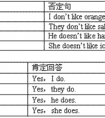单句改错。( )1. I am (A) enjoying (B) to sing (C) English songs (D). ( )2. I used (A) to playing (B) with my friends, but now I hardly (C) have time to do it -九年级英语
注意:如果在这类名词前加冠词,则表示去那里干与之无关的事,例:
go to the school 可理解为去学校看望人,而不是“学习”。
4.在表示职位、头衔、身份等名词前,例:
(/)Professor Wang 王教授
(/)Doctor Tompson 汤普生医生
(/)President Lincoln 林肯总统
(/)Dean of the English Department 英语系主任
5.泛指的复数名词,表示一类人或事物时,可不用定冠词(泛指的复数名词非零冠词):
They are teachers. 他们是教师。
当两个或两个以上名词并用时,常省去冠词;
I can't write without pen or pencil.没有钢笔和铅笔,我就写不了字。
6.当by 与火车等交通工具连用,表示一种方式时,中间无冠词,例:
by bus,by train;
7.有些个体名词不用冠词,如:
(/)school,(/)college,(/)prison,(/)market,(/)hospital,(/)bed,(/)table,(/)class,(/)town,(/)church,(/)court
等个体名词,直接置于介词后,表示该名词的不同含义:
go to hospital 去医院看病 ;
go to the hospital去医院 (并不是去看病,而是有其他目的)
in bed 生病卧床 ;
in the bed 在床上
in table 就餐 ;
in the table\tables 在桌旁
8.不用冠词的序数词:
a. 序数词前有物主代词
b. 序数词作副词:
He came (/)first in the race.
c. 在固定词组中:
at (/或the) first,first of all,
from first to last
注:三餐饭前带有形容词修饰时,应加冠词:
have a quick breakfast .
当球类指具体事物时,应加冠词:
where is the football ?
9.某些中国乐器前面不加冠词,例如:
play (/)erhu;play (/)dizi ( 弹古筝 play the zither 吹笛子 play the flute)
10.有些物质名词和抽象名词前永远用零冠词,即使有形容词,也用零冠词。常见的有:
(/)weather,(/)progress,(/)fun,(/)advise,(/)news,(/)information,(/)luck,(/)furniture,(/)wealth,(/)honesty 等。
另外,man 表示“人类”和word 表示:“音讯时一般不加冠词,如:
It is well known that (/)man has a very close relationship with (/)environment。众所周知,人类与环境关系非常密切。
11.在表示颜色和语言的名词前用零冠词,例:
She is in(/)red 她穿红色衣服(=She is in a red dress)
12.特殊动词后用零冠词,如:
He turns(/)a father.
(/)Student as he is.
注:为了区分不加冠词和加零冠词的两种情况,本帖特别使用表示零冠词的“(/)”符号表示零冠词。
零冠词使用口诀及注释:
下列情况免冠词,代词限定名词前,
专有名词不可数,科球类三餐饭,
复数名词表泛指,两季星期月份前,
颜色语种和国名,称呼习语和头衔
注释:
1.下列情况免冠词,代词限定名词前,
代词限定词放在名词的前面时,名词不加冠词
例:my book; any book
2.专有名词不可数,科球类三餐饭,
1)不可数名词,专有名词通常不加冠词。
例:Failure is the mother of success. 失败乃成功之母
2)在三餐、球类运动和娱乐运动的名称前,不加冠词,如have breakfast,play chess。
3.复数名词表泛指,两季星期月份前,
例:We go to school from Monday to Friday. 我们从星期一到星期五都上课。
4.颜色语种和国名,称呼习语和头衔
1)颜色语种和国名如 in black; in English; in Canada
2)在称呼或表示官衔,职位的名词前不加冠词。
例:The guards took the American to General Lee. 士兵们把这个美国人送到李将军那里。
一、介词+零冠词+名词
at present
beyond hope of
by chance
by day
by hand
by rule
face to face
from beginning
hand in hand
in battle
in danger of
in defence of
in fact
in fear
in hopes of
in issue
in place of
in spit of
in time
on account of
on business
on earth
on credit
on foot
on hand
out of date
side by side
with credit
二、动词+零冠词+名词
cast anchor
catch fire
change gear
get fun
give battle
give way
lose heart
make way
send word
set sail
三、动词+零冠词+名词+介词
catch sight of
do duty for
find fault with
make use of
set fire to
take hold of
take exception to
take part in
take care of
考点名称:副词
- 副词:
是一种用来修饰动词、形容词、全句的词,说明时间、地点、程度、方式等概念的词。副词是一种半虚半实的词。
副词可分为:地点副词、方式副词、程度副词、疑问副词和连接副词。
副词连用顺序:程度副词+方式副词+地点副词+时间副词。 副词分类:
1、时间副词有三类:always, often, usually, sometimes, never, ever, hardly等一般位于系动词、情态动词和助动词之后,实之前义动词
1)表示发生时间的副词:
It’s beginning to rain now! 现在开始下雨了!
2)表示频繁程度的副词,也称频度副词always, often, usually, sometimes, never, ever, hardly等一般位于系动词、情态动词和助动词之后,实之前义动词:
She often changes her mind. 她常改变主意。
3)还有一些其他表示时间的副词:
He has just had an operation. 他刚动过手术。
2、地点副词:
1)有不少表示地点的副词:
She is studying abroad. 她在国外留学。
2)还有一些部分与介词同形的副词。它们与介词同形,跟宾语的是介词,否则是副词:
①用作介词:Stand up! 起立!
②用作副词:A cat climbed up the tree. 猫爬上了树。
3)以where 构成的副词也是地点副词:
It’s the same everywhere. 到处都一样。
3、方式副词:
carefully, properly(适当地), anxiously(焦虑地), suddenly, normally(正常地), fast, well, calmly(冷静地), politely(有礼貌地), proudly(自豪地), softly, warmly ,slowly
4、程度副词:
much,little, very,rather(相当),so,too,still, quite, perfectly(完美地), enough, extremely(非常), entirely(整个),almost, slightly(细小地), hardly.
5、疑问副词:
how, when, where, why.
6、关系副词:
when, where, why.等。
7、 连接副词:
therefore(因此),moreover(此外),however,otherwise(另外的),then,when ,where,how,why等。副词的语法作用:
副词在句中可作状语,表语,补语,定语。
He works hard. (作状语)
他工作努力。
You speak English very well. (作状语)
你英语讲的相当好。
Is she in ? (作表语)
她在家吗?
Let's be out. (作表语)
让我们出去吧。
Food here is hardly to get. (here作定语,hardly作状语)
这儿很难弄到食物。
Let him out!(作补语)
让他出去!
修饰名词的副词放在被修饰词之后
a. The villagers there are busy getting in wheat.不同类型副词的用法比较:
方式副词:
1)英语中有大量方式副词,说明行为方式(回答how的问题):
How beautifully your wife dances. 你夫人舞跳的真美。
2)还有相当多的副词,表示某些情绪:
She smiled gratefully. 她感激的笑了笑。
3)还有一些以-ly结尾的副词,表示动作发生的状况:
He left the town secretly. 他悄然离开了这座城市。
程度副词和强调副词 :
1)程度副词可修饰动词,表示“到某种程度”: Is she badly hurt? 她伤得重吗?
[说明] 这类副词除修饰动词外,还可修饰形容词(a)或另一副词(b):
a. fairly simple 相当简单 quite correct 完全正确
b. wonderfully well 好极了 do it very quickly 干得很快
2)much 是一个特殊的程度副词,它可以:
a. 修饰形容词等:
I’m not much good at singing. 我唱歌不太好。
b. 修饰比较级:
You sing much better than me. 你比我唱的好多了。
Their house is much nicer than ours. 他们的房子比我们的好多了。
疑问副词和连接副词:
1)疑问副词:疑问副词用来引导特殊问句:
how: How is your grandmother? 你奶奶身体好吗?
where: Where does she come from? 她是哪儿人?
when: When can you come? 你什么时候能来?
why: Why was he so late? 他为什么来得这么晚?
2)连接副词:连接副词意思和词形都和疑问副词一样,但都引导从句或与不定式连用:
how: Do you know how to start this machine? 你知道这台机器怎样启动吗?
where: I don’t know where he lives. 我不知道他住在哪儿。(引导宾语从句)
when: Tell me when you’ll be ready. 告诉我你什么时候准备好。(引导宾语从句)
why: That’s why I came round. 这就是我来的原因。(引导表语从句)
- 最新内容
- 相关内容
- 网友推荐
- 图文推荐
| [家长教育] 孩子为什么会和父母感情疏离? (2019-07-14) |
| [教师分享] 给远方姐姐的一封信 (2018-11-07) |
| [教师分享] 伸缩门 (2018-11-07) |
| [教师分享] 回家乡 (2018-11-07) |
| [教师分享] 是风味也是人间 (2018-11-07) |
| [教师分享] 一句格言的启示 (2018-11-07) |
| [教师分享] 无规矩不成方圆 (2018-11-07) |
| [教师分享] 第十届全国教育名家论坛有感(二) (2018-11-07) |
| [教师分享] 贪玩的小狗 (2018-11-07) |
| [教师分享] 未命名文章 (2018-11-07) |

![Which of the following can you probably see in the meeting room? [ ]A. B. C.D. -七年级英语](http://www.00-edu.com/d/file/ks/4/2/dongmingci/2020-01-08/small97361980a56115e1c9237567439904fe1578422951.jpg)

![—Can the boy finish_____ the book in about a week? —I think he can. [ ]A. read B. reading C. to read D. reads -八年级英语](http://www.00-edu.com/d/file/ks/4/2/dongmingci/2020-01-08/smallfa4d713075e249356362fe7392193a301578421751.png)


